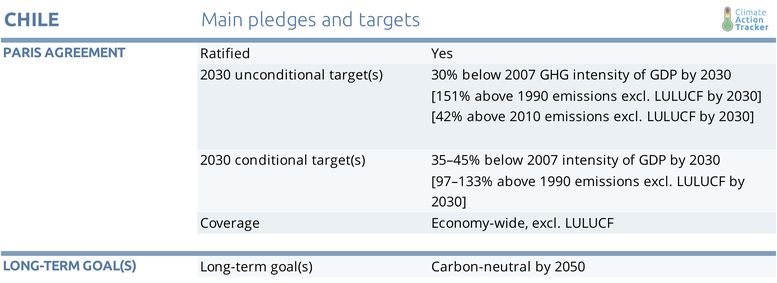Country summary
Overview
As the host of the upcoming UNFCCC COP25, Chile has a unique opportunity to demonstrate its leadership on ambitious actions to reduce carbon emissions.
In June 2019, Chile announced its plan to completely phase out coal by 2040 and aim towards carbon-neutrality by 2050, a move that could bring it within the CAT’s 1.5˚C Paris Agreement compatibility rating.
The coal phase-out plan is divided into two stages. First, by 2024, Chile will close eight of its oldest coal-fired power plants—equivalent to 20% of its current coal electricity capacity. This is a remarkable step for a country with a 40% coal share in their electricity mix and a prime example of the type of short-term actions needed to limit temperature increase to 1.5°C as required by the Paris Agreement.
Second, Chile will phase out its remaining 20 coal plants by 2040, but has not yet specified a detailed phase-out schedule.
In its 2050 Energy Strategy of 2015, Chile had announced renewable energy targets of at least 60% by 2035 and 70% by 2050 for electricity generation. Notably, most recent energy sector planning documents—the Mitigation Plan for the Energy Sector, and the Electromobility Strategy—are aligned with these goals.
The Chilean electromobility strategy sets out an action plan to achieve a 40% share of the private vehicle fleet—and 100% of public urban transport—being electric by 2050. Chile has already made some steps in the right direction: as of January 2019, Chile had the second-largest electric urban public bus fleet in the world (after China), making Chile a pioneer for electric buses in Latin America.
Our analysis which, in comparison to previous assessments, now takes into account emissions reductions from the Electromobility Strategy and the retirement of the first eight coal-fired power plants, suggests that Chile will overachieve its 2020 pledge, and meet its unconditional and conditional Nationally Determined Contribution (NDC) Paris Agreement targets with currently implemented policies.
Additionally, we have estimated the impact of a complete coal phase-out by 2040 under a planned policies scenario. Under this scenario Chile would get to our 2°C compatible range. We have also estimated a range for Chile’s net-zero carbon target for 2050. While this highly depends on the size of their forestry sinks, we estimate that the lower end of the range would be consistent with the CAT rating category of 1.5°C Paris Agreement compatible for Chile. For full details see fair share section.
The Climate Action Tracker rates countries based on their NDC targets – the Chilean 2030 pledge is rated “Highly insufficient.” If Chile were to enhance their NDC to reflect their new targets of phasing out coal by 2040 and achieving carbon-neutrality in 2050, we would upgrade their CAT rating. For full details see pledges and targets section.


Chile is currently formulating a new Climate Change Framework Law whose main objectives are to build an institutional framework for climate change mitigation and adaptation policies in every sector in order to better integrate and achieve mitigation targets.
Chile’s overarching Climate Action Plan 2017–2022 guides climate mitigation actions and intends to advance mitigation measures by maintaining the national GHG inventory, developing policy, implementing MRV systems, and fulfilling Chile’s international commitments.
Since setting its renewable energy targets in 2015, Chile has published planning documents that align with them. Additionally, the Energy Route 2018–2022 establishes commitments for further emissions reductions.
These commitments include quadrupling small distributed renewable energy capacity by 2022, establishing a legal framework for energy efficiency in the industry, mining, transport, and buildings sector, implementing a ten-fold increase of current EVs share, regulating solid biofuels (i.e. wood), starting the process of decarbonising the energy matrix and establishing a concrete phase-out plan for coal-fired power plants.
Besides setting goals and developing plans, Chile has also started to take action. In 2018, Chile started to move away from coal, increased its renewable energy generation share to 21%, reformed its “Net Billing” Law, significantly increased its electric taxis and urban electric bus shares, and introduced a new Energy Efficiency Law – which has been approved by the Congress but will only be implemented after the approval of the Comptroller General of Chile and its publication in the Official Journal.
Further analysis
Latest publications
Stay informed
Subscribe to our newsletter




